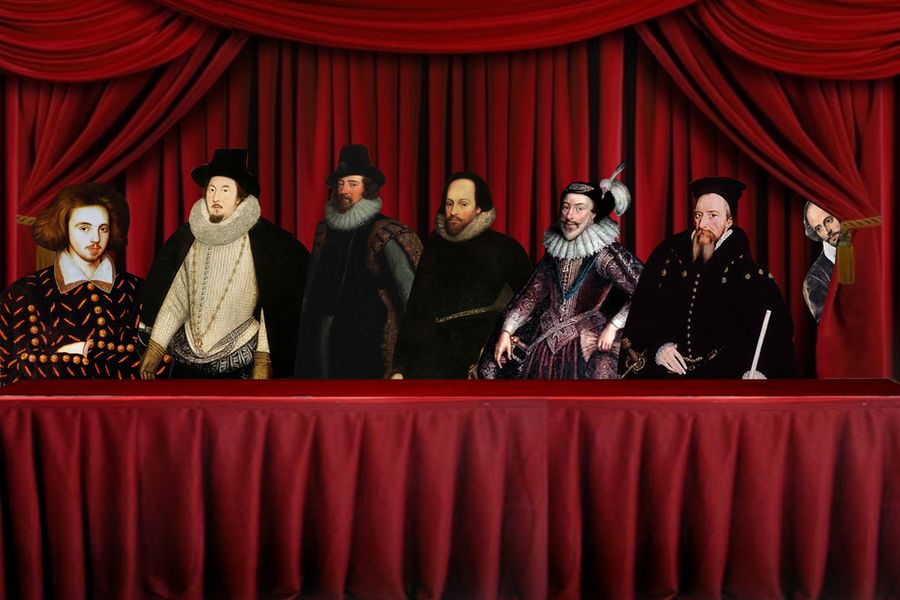One of the fun pastimes of the Elizabethian era was Shakespeare-hating. And it continues to be a great literary sport till today.
We don’t know when Shakespeare started writing, but we do know that by 1592 critics already hated him. Robert Greene, a playwright of that era, was quite contemptuous of Shakespeare. And probably a bit jealous of him too. “…there is an upstart Crow …supposes he is as well able to bombast out a blank verse as the best of you: and being an absolute Johannes factotum, is in his own conceit the only Shake-scene in a country.” I had no idea what Robert was trying to say, so I had to look it up. Apparently, Johannes Factotum means Jack-of-all-trades. Still unclear, but apparently Robert was referring to Shakespeare as a mediocre, unoriginal, second-rate writer.
Critiquing Shakespeare was so much fun that Ben Johnson, another playwright and scholarly author, did not want to be left out. He said that the Bard ‘wanted art’. Naturally I thought he meant Shakespeare used to sneak around stealthily on midsummer nights, stealing overpriced paintings. But apparently, when Ben said ‘wanted art’, he meant Shakespeare lacked creative skills. (Ben Johnson should not be confused with Sam Johnson, father of the Dictionary and a huge fan of Shakespeare. For without Shakespeare’s contributions, this logophile’s lexicon would have been about two thousand words shorter.)
Naturally, such bad reviews only made the theatre-going public quite curious. Who was this new second-rate writer who lacked creative skills? And why did Robert Greene call him ‘Shake-scene’? Does he stand behind stage sceneries and shake the artificial backdrop for dramatic effect? The commoners fought each other (though politely I am sure) to get tickets to see how bad Shakespeare’s plays were. And the upper class just went to see all those damn foreigners come to a grisly end – foreigners like that black Moor Othello and that crown-seeking, toga-clad Julius. And on fortuitous days, the entire audience would get to see a popular actor collapse on stage due to complications caused by overacting.
By now, Shakespeare was so confident that people would pay good money to see witches brewing up trouble, or teenagers committing suicide, that he started his own theater company, Lord Chamberlain’s Men. By the 1590s, probably all of London had seen Shakespeare’s plays, with a few exceptions – the illiterate who could not understand what the drama was about, the handicapped who were physically unable to get into theatres, and Queen Elizabeth I who would be hounded by paparazzi and autograph-seekers if she stepped out of her palace. But those were the good old days – if the Queen could not go to a theatre, the theatre would come to the Queen. So Shakespeare brought his plays to the royal palace and performed for, well, the royals. And when she saw for herself how love’s labour was lost and how the shrew was tamed, Queen Elizabeth became Shakespeare’s fan and patron. The Elizabethan era was a golden age for the arts. So if you are a playwright, you missed a great opportunity by not being there.
If things went well for Shakespeare humously, they got even better for him posthumously. During his own time he was a tall theatre personality, but by the end of the 17th century, he had become a giant dramatist. And by the early 19th century, all kinds of fans were celebrating his literary legacy – people seeking cheap thrills loved the melodramatic performances on stage, while intellectuals preferred to read this genius poet in print.
Shakespeare’s soul was at peace… But not for long.
Over the years there had been careless whispers about the authenticity of Shakespeare’s authorship. No one could have written so many plays and poems in such a short time, critics said, except possibly Mr. Edgar Wallace. (Wallace was so prolific in the 1900s, that his publisher claimed one quarter of all books in England were written by him.)
But we are still in the 1850s, when an American woman was very unhappy. Delia Bacon, after a troubled childhood and a disastrous love affair with a younger man, decided to focus her hatred and unhappiness on one man – Shakespeare. She hated Shakespeare so much that she wanted to open his tomb to find proof he was a fraud. But to do all this, she had to go to England. Now scholars on student visas know that researching in England costs a fortune. So Delia found a sponsor, Mr. Ralph Waldo Emerson, whose wealth was proportional to his curiosity about Shakespeare’s literary legitimacy. And so, armed with an expense account, Delia went to England and searched and researched and pronounced her verdict – sorry world, Shakespeare was just a ‘vulgar, illiterate deer poacher and Lord Leicester’s stable boy’.
This was probably the beginning of the official Anti-Stratfordian club. And you could become a member if your favourite therapeutic pastime was Bard-bashing. Anti-Stratfordians were an assorted group of intellectuals and celebrities, from various times and various places, but they all had one thing in common – they hated the sleepy town of Stratford Upon Avon. This is true. They argue vehemently that this undeveloped, backward town lacked the proper educational facilities and cultural environment required to nurture a literary genius. After all, Shakespeare was born, baptized, banned from bars, and buried in Stratford. So how could someone from a working class Stratford family know so much about aristocratic lifestyles and royal protocols? How could he write convincingly about court politics and kingly pastimes? And considering England’s strict immigration policies, how the heck did he learn all this stuff about Greeks and Italians and write plays about them?
You see, Stratford was only known for selling, shearing and slaughtering sheep. So with all this sheep slaughtering going on, the best Shakespeare could have written was, probably, The Silence Of The Lambs. But definitely not the historic Henry sequels.
Anti-Stratfordians also point out there is no evidence to prove Shakespeare even stepped inside a classroom – no school or college roster records, no records of teachers or classmates. So, as Delia claims, he must have been an illiterate deer poacher. So in the blink of an Anti-Stratfordian eye, the bard went from authoring Merchant of Venice to being an unauthorised merchant of venison. But personally I think there is a possible explanation for the lack of academic records – Stratford officials were lousy record-keepers. And most available papers, academic or otherwise, ended up being used for sheepish purposes.
So if Shakespeare did not know how to write, who actually wrote his plays for him? Aha, say the Anti-Stratfordians, there are APPs for that (Alternate Potential Playwrights). The plays were probably written by properly educated, upper-class personages who, for unknown reasons, decided to remain anonymous. And gift his or her fame to an underprivileged, overrated actor named Shakespeare. Over the years, about 80 possible candidates have been proposed as the right writers – including Sir Francis Bacon, Christopher Marlowe, Edward de Vere the 17th Earl of Oxford, Sir Francis Drake, Queen Elizabeth I, and (don’t know how these guys got dragged in) the Jesuits.
So who are these Anti-Stratfordians who think Shakespeare is a fake? The list is long and ongoing – Ralph Waldo Emerson, Mark Twain, Orson Welles, Walt Whitman, Charlie Chaplin, Sigmund Freud… Of course, Freud was probably thinking about multiple personality disorders when he decided Shakespeare was not one person, but multiple authors.
But were these plays really written by other authors, or is the Anti-Stratfordian theory just much ado about nothing? Unfortunately for the Anti Stratfordians, there are documentary evidences to prove Shakespeare wrote the plays – title pages, accounts of contemporary historians and critics, and other official theatre records.
Also, if Shakespeare had not been the author, then surely he must have been the world’s greatest actor. For he managed to convincingly fool jealous playwrights, caustic critics, discerning theater audiences, literary scholars, Queen Elizabeth I, King James I, all the courtiers, and the entire literate population of England.
There are so many theories about Shakespeare’s authorship. So not to be left out, I too decided to come up with a theory. I think Shakespeare wrote the plays, but he had help… According to Indian astrology and numerology, a person’s name plays a vital role in his or her fate. The letter your name starts with, the number of alphabets and vowels in your name – these decide your success or failure in life. Now Shakespeare was actually baptized as Guiliamus filius Johannes Shakspere, a fancy Latin phrase which just means ‘William son of John Shakspere’. As you might have noticed, his given name was actually ‘Shakspere’. My theory is that somewhere along the way, probably during his early days in London, he met an Indian astrologer who gave him good advice – ‘if you add a couple of vowels to your name, you will find great fame and fortune, just as you like it’. And so, after an ‘e’ and ‘a’ were strategically inserted, all the world became his stage.
Happy 457th, Mr. Shakespeare!







 Users Today : 0
Users Today : 0
April 19, 2021 at 5:56 am
A well researched write up. Your theory indeed throws light on the authorship of his plays…. there had to be an Indian involved!! Enjoyed reading it.
April 21, 2021 at 1:56 pm
Brilliant literary excavation is an understatement…the same passion that sent a Della(?) on an arduous &American aided (Emerson to boot) treasure hunt on the authenticity of the (inglorious) Bards escapades. makes both painful reading wishing it was otherwise .. Enjoying royal patronage has always been Shakesphers Crown…the Sonnets… absolutely engaging writeup…the idol has not fallen !!
April 23, 2021 at 3:59 pm
Thank you Suchi, for your feedback. Wonderful to get these comments from a fan of the Bard’s.